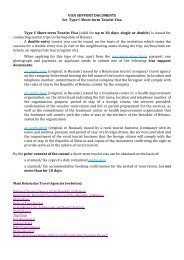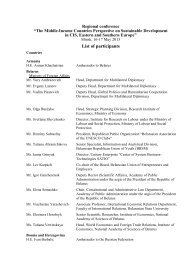Universal public healthand education policiescan be designed andimplemented withoutsacrificing quality for thesake of greater coveragecare providers were given incentives by linkingresources to performance. As a result,health care became more affordable in ruralareas. And there were visible improvementsin health outcomes. Under-five mortality fellfrom 196 deaths per 1,000 live births in 2000to 103 in 2007, and the maternal mortalityratio declined more than 12% a year over2000–2008. Rwanda is on track to reach theMillennium <strong>Development</strong> Goal for maternalhealth.One concern in a number of countries is theemergence of dual-track services. Even if publicprovision is universal in principle, quality andaccess may be poor, driving people towardsexpensive private providers.• China. Much of China’s health care successtook place between 1950 and 1980, whenthe government established a three-levelsystem of village clinics, township healthcentres and county hospitals in rural areasand health centres and district hospitals inurban areas. Since the 1980s, however, thehealth sector has been driven by a fee-forservicemodel. As a result, while China’soverall health status has continued to improve,disparities have grown between theeastern and western provinces and betweenrural and urban areas. In many parts of thecountry quality health care has become unaffordablefor the poor.• Chile. Before 1980, Chile’s health systemwas publicly financed through social securityand public funds. After health reformin 1981, however, risk insurance was introduced,and market mechanisms beganto regulate levels of protection. By 2006, adual system of coverage was in place. TheNational Health Care Fund, funded by federalgovernment tax revenues and by premiumsfrom beneficiaries, covered 69% of thepopulation, but its resource constraintshave prevented it from ensuring timely andquality services. Private health insurancecompanies covered 17% of the population.The National Health Care Fund offers auniversal health plan. This dual system hasbeen criticized because it leaves low-incomeand high-risk populations to be treatedmainly in the public system, which is poorlyresourced and thus tends to provide lowerquality service. In 2004, aware of the risks,the state introduced El Plan de AccesoUniversal de Garantías Explícitas, whichguarantees a medical benefits package consistingof a prioritized list of diagnoses andtreatment for 56 health conditions, as wellas universal coverage for all citizens.Providing universal health care and at leastnine years of compulsory education requiresstrong state commitment, involvement andconsistency over time. The challenge for countriesin the South is to ensure equity in access tohealth and education services and basic qualitystandards to prevent a dual-track service industrythat provides low-quality public services(or none at all) to the poor and higher qualityprivate services to the rich.Universal public health and educationpolicies can be designed and implementedwithout sacrificing quality for the sake ofgreater coverage. Poor people have no alternativesto a public system, while wealthierpeople can pay for private services. Suchdynamics entrench inequalities, reduce socialintegration and undermine sustainable humandevelopment. New programmes, such as thosein China, Mexico and Thailand, illustrate thepossibilities of ensuring that basic services areuniversal and of reasonable quality. Whenfinancial resources are adequately provided,publicly provided services need not be inferiorto private services.Increasing social cohesion bybroadening developmentTransforming development requires that allcitizens feel vested in the broader goals ofsociety, showing respect and compassion forothers and a commitment to building socialcohesion. This requires that states and citizensunderstand that human development is aboutmore than just enhancing individual capabilities.Individual capabilities are embedded ina broader social system whose health requiresenhanced social competencies (see box 1.7 inchapter 1).More effective social protection systems arealso needed to help individuals and communitiesmanage risks to their welfare. Globalizationhas contributed to the dismantling of someaspects of social protection and social insurance,especially for systems relying on universal82 | HUMAN DEVELOPMENT REPORT <strong>2013</strong>
coverage and large government expenditures.At the same time, it has increased the need forsocial protection, as fluctuations in economicactivity become more frequent. Thus, socialpolicies become as important as economicpolicies in advancing human development. Infact, social and economic policies can hardlybe disentangled because their goals and instrumentsare analogous. 104In many parts of the South, states have introducedand provided social protection programmesto integrate poor people into the neweconomy. Cash transfer programmes have beenparticularly important in reducing povertyand improving income inequality throughredistribution. But transfers cannot substitutefor public provision of essential goods andservices (box 3.8). At best, they can supplementresources of the poor. Offering cash sothat households can buy health care of theirchoice is unlikely to work where high- qualityhealth care is in short supply. Similarly, givingcash to households so that they can choosetheir school is unlikely to help the poor if fewschools offer high- quality education. Nor cancash transfers substitute for incomes earnedthrough decent work.• India. India’s National Rural EmploymentGuarantee Scheme provides up to 100 daysof unskilled manual labour to eligible ruralpoor at the statutory minimum agriculturallabour wage. This initiative is promising becauseit provides access to income and someinsurance for the poor against the vagariesof seasonal work and affords individuals theself-respect and empowerment associatedwith work. 105 In addition, it aims to helpbuild economies in rural areas by developinginfrastructure. The scheme has innovativedesign features such as social auditsand advanced monitoring and informationsystems.Cash transferprogrammes—importantin reducing povertyand improving incomeinequality—cannotsubstitute for publicprovision of essentialgoods and servicesBOX 3.8Cevdet Yılmaz, Minister of <strong>Development</strong>, TurkeyStrengthening social protection in TurkeyAs recently as 2002, an estimated 30% of Turkey’s people lived below thegovernment’s poverty threshold of $4.30 a day. Government spending on socialprotection accounted for just 12% of GDP, less than half the EU averageof 25%. And expenditures on social assistance for the poor accounted foronly 0.5% of GDP, prompting criticism that Turkey’s social support systemswere both fragmented and insufficient.Over the past decade, however, Turkey’s strong economic performance,pro-poor approach to social policies and targeted assistance with greaterresources have helped accelerate poverty reduction. Key policy changesinclude systematic strengthening of social assistance programmes, conditionalcash transfers, social security reforms and an ambitious transformationof the national public health system. Under the conditional cash transferprogramme alone, launched in 2003, more than 1 million children have receivedhealth care support, and about 2.2 million have benefited from educationaid. School children have received more than 1.3 billion textbooks since2003 under a new free schoolbook programme, and nearly 1 million now getfree transportation to school.As a result of these and other initiatives, the share of the populationliving on less than $4.30 a day fell sharply, to 3.7% in 2010, and the share ofGDP devoted to poverty assistance and related social services nearly tripled,to 1.2%.The share of social expenditures in Turkey’s GDP is still less than the EUaverage, and social assistance schemes have not yet had the desired impacton poverty rates. To increase their effectiveness, the government is workingon new methods of poverty measurement and social protection, new approachesto in-kind and cash assistance, stronger links to job opportunitiesand continuing consultations with targeted communities and households.Similarly, the expansion and modernization of health services havehad a direct, measurable impact on public health. Health insurance isnow available to the entire population. Under the Health TransformationProgramme launched in 2003, family practitioners were assigned to familiesto strengthen basic health services, with primary and emergency healthcare provided free of charge. The results have been swift and encouraging.For the first time, almost all children are getting free regular vaccinations.Seven million schoolchildren get free milk every day. Iron and vitamin Dsupplements are provided without charge to mothers and children. Infantmortality rates have fallen sharply, to 10 per 1,000 live births in 2010, downfrom 29 in 2003, according to government figures. This two-thirds dropgreatly exceeds the reduction targeted under the Millennium <strong>Development</strong>Goals.Pro-child policies go beyond health care and education, to broader assistancefor their home communities. The government started a new SocialSupport Program in 2008 to develop social cohesion and ensure social integration,particularly in the less-developed eastern regions of the country. Itsprojects aim to increase participation in national economic and social lifeby disadvantaged people marginalized by poverty and social exclusion. Thegoals of the programme’s several thousand projects to date go beyond jobcreation in these lower income regions to include support for young peopleand women to express themselves through cultural, artistic and athleticaccomplishments.More important, though, is what these improvements already mean tothe lives of ordinary Turkish families. Throughout the country, parents andchildren alike can now look forward to healthier, more secure, more fulfillinglives—the underlying goal and core principle of human development.Chapter 3 Drivers of development transformation | 83
- Page 1 and 2:
WNSEHuman DevelopmentReport 2013The
- Page 3 and 4:
Human Development Report 2013The Ri
- Page 5 and 6:
Human Development Report 2013 TeamD
- Page 7 and 8:
Finally, the Report also calls for
- Page 9 and 10:
Heather Simpson, Ben Slay, Mounir T
- Page 11 and 12:
3.6 India’s Supreme Court issues
- Page 13 and 14:
OverviewOne of the most heartening
- Page 15 and 16:
and sustainability are fully incorp
- Page 17 and 18:
Without investment in people, retur
- Page 19 and 20:
opportunity to reap the full benefi
- Page 21 and 22:
Woods institutions, the United Nati
- Page 23 and 24:
IntroductionWhen developed economie
- Page 25 and 26:
leading economies—Brazil, China a
- Page 27 and 28:
comparable access to information, e
- Page 29 and 30:
mobile phones: cellular banking is
- Page 32 and 33:
“The political problem ofmankind
- Page 34 and 35:
BOX 1.1Fairness, macroeconomics and
- Page 36 and 37:
BOX 1.3Amartya Sen, Nobel Laureate
- Page 38 and 39:
FIGURE 1.1Income per capita is risi
- Page 40 and 41:
BOX 1.4Subjective indicators of wel
- Page 42 and 43:
FIGURE 1.4There is notable variatio
- Page 44 and 45: FIGURE 1.6Most regions show declini
- Page 46 and 47: Progress in humandevelopment achiev
- Page 48 and 49: BOX 1.7Social competencies: human d
- Page 50 and 51: TABLE 1.3Inequality and satisfactio
- Page 52 and 53: Not all countries havethe precondit
- Page 54 and 55: “When the music changes,so does t
- Page 56 and 57: BOX 2.1The South’s integration wi
- Page 58 and 59: FIGURE 2.1As a share of world merch
- Page 60 and 61: BOX 2.2Acquisitions by the South of
- Page 62 and 63: FIGURE 2.3Between 2000 and 2010, In
- Page 64 and 65: FIGURE 2.4Export earnings per capit
- Page 66 and 67: BOX 2.6Final assembly is about more
- Page 68 and 69: Instead of having a centreof indust
- Page 70 and 71: FIGURE 2.6Emerging market economies
- Page 72 and 73: Developing countriestrade more amon
- Page 74 and 75: “We cannot expect thatall nations
- Page 76 and 77: TABLE 3.1Selected developing countr
- Page 78 and 79: A common featureof countries thatha
- Page 80 and 81: More important thangetting prices r
- Page 82 and 83: BOX 3.5Eastern Europe and Central A
- Page 84 and 85: States have to beconscious that the
- Page 86 and 87: As countries develop,they tend to d
- Page 88 and 89: Having weathered theAsian financial
- Page 90 and 91: Providing publicservices that contr
- Page 92 and 93: Advancing health requiresmore than
- Page 96 and 97: • China. The Minimum Livelihood G
- Page 98 and 99: “Each generation will reap whatth
- Page 100 and 101: concerns will make for a complex en
- Page 102 and 103: A greater emphasison education cans
- Page 104 and 105: FIGURE 4.1Under the fast track scen
- Page 106 and 107: Around the worldpeople are calling
- Page 108 and 109: FIGURE 4.4Different environmental s
- Page 110 and 111: FIGURE 4.5Education policies can al
- Page 112 and 113: BOX 4.2China and Ghana: who benefit
- Page 114 and 115: FIGURE 4.8countries thus converge t
- Page 116 and 117: “Let us join hands to try tocreat
- Page 118 and 119: Areas of globalinternational concer
- Page 120 and 121: Addressing climatechange requires t
- Page 122 and 123: International governanceis increasi
- Page 124 and 125: BOX 5.2Jo Leinen, Member of the Eur
- Page 126 and 127: facilitates reserve investments and
- Page 128 and 129: Responsible sovereigntytakes the lo
- Page 130 and 131: FIGURE 5.1Under the accelerated pro
- Page 132 and 133: Good policymakingrequires greater f
- Page 134 and 135: A fair and less unequalworld requir
- Page 137 and 138: NotesOverview1 Atsmon and others 20
- Page 139 and 140: 25 Blinder 2006.26 UNIDO 2009.27 UN
- Page 141 and 142: which is 61.7 deaths per 1,000 live
- Page 143 and 144: ReferencesAbdurazakov, A., A. Minsa
- Page 145 and 146:
urban_world_cities_and_the_rise_of_
- Page 147 and 148:
Kamau, P., D. McCormick, and N. Pin
- Page 149 and 150:
Labor Administration. Geneva: Inter
- Page 151 and 152:
Human Development Report 2013The Ri
- Page 153 and 154:
Statistical acknowledgementsThe Rep
- Page 155 and 156:
Key to HDI countries and ranks, 201
- Page 157 and 158:
Human Development Report 2013The Ri
- Page 159 and 160:
Human Development Report 2013The Ri
- Page 161 and 162:
Human Development Report 2013The Ri
- Page 163 and 164:
Human Development Report 2013The Ri
- Page 165 and 166:
Human Development Report 2013The Ri
- Page 167 and 168:
Human Development Report 2013The Ri
- Page 169 and 170:
Human Development Report 2013The Ri
- Page 171 and 172:
Human Development Report 2013The Ri
- Page 173 and 174:
Human Development Report 2013The Ri
- Page 175 and 176:
Human Development Report 2013The Ri
- Page 177 and 178:
Human Development Report 2013The Ri
- Page 179 and 180:
Human Development Report 2013The Ri
- Page 181 and 182:
Human Development Report 2013The Ri
- Page 183 and 184:
Human Development Report 2013The Ri
- Page 185 and 186:
Human Development Report 2013The Ri
- Page 187 and 188:
Human Development Report 2013The Ri
- Page 189 and 190:
Human Development Report 2013The Ri
- Page 191 and 192:
Human Development Report 2013The Ri
- Page 193 and 194:
Human Development Report 2013The Ri
- Page 195 and 196:
Human Development Report 2013The Ri
- Page 197 and 198:
Human Development Report 2013The Ri
- Page 199 and 200:
Human Development Report 2013The Ri
- Page 201 and 202:
Human Development Report 2013The Ri
- Page 203 and 204:
Human Development Report 2013The Ri
- Page 205 and 206:
Human Development Report 2013The Ri
- Page 207 and 208:
Human Development Report 2013The Ri
- Page 209 and 210:
Human Development Report 2013The Ri
- Page 211 and 212:
Statistical referencesADB (Asian De
- Page 213 and 214:
Core features of the model pertinen
- Page 215 and 216:
Countries and HDI ranks in 2012 and
















